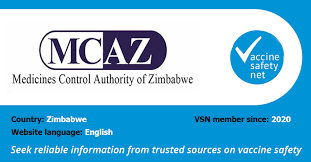Staff Reporter
The Medicines Control Authority of Zimbabwe (MCAZ) has kicked off its 9th Annual MedSafety Week Campaign, joining a global movement to encourage patients and healthcare providers to report adverse reactions to medications.
Running from November 4th to 10th, this campaign unites 107 organisations across 94 countries, all working to raise awareness on the importance of monitoring medication safety.
In an interview with this publication yesterday, MCAZ Public Relations Officer Davison Kaiyo emphasised the critical role of patient feedback, highlighting the benefits of medicine use while encouraging individuals to take an active role in safeguarding their health by reporting any adverse reactions they may experience.
“The #MedSafety Week is a global campaign to encourage people to report any side effects they experience after taking medicines. Many individuals rely on medicines to treat various ailments, but sometimes they react to these medicines, experiencing what we call side effects or adverse reactions. This campaign highlights the need for people to report these side effects so we can address them,” said Kaiyo.
As Zimbabwe’s National Pharmacovigilance Centre, MCAZ monitors the safety and quality of medicines through post-market surveillance. This process involves collecting and investigating reports of side effects, which can be submitted through healthcare providers, MCAZ’s online platforms, or social media.
“We have a dedicated pharmacovigilance division that focuses on these issues,” Kaiyo explained.
Furthermore, Kaiyo noted that once MCAZ receives a report of an adverse reaction, they conduct an investigation to determine whether the medication is the cause.
“Our team carries out investigations and laboratory testing to verify the report. If it is confirmed that the medicine caused the reaction, we take the necessary action, which can include a product recall depending on the severity. This ensures that reports from the public play a vital role in maintaining safe, quality medications on the market.
“Reporting adverse reactions helps us ensure that the medicines available are safe, effective, and of high quality. If a patient experiences negative effects after taking a medication, they can report it through their healthcare provider or our various reporting channels, including our website, social media, or even WhatsApp,” he said.
Dr. Susan Mutambu highlighted that this year’s MedSafety Week Campaign is focused on fostering collaboration and transparency in medication safety.
“The campaign provides a crucial platform for patients to voice their experiences, allowing MCAZ to quickly address potential safety concerns. With multiple accessible reporting channels, such as walk-ins, online submissions, and social media, MCAZ is ensuring that the public can easily contribute to safeguarding medication use,” she said.
Through MedSafety Week, MCAZ continues to fulfil its mission of safeguarding the health of Zimbabweans. By empowering patients and working closely with healthcare providers, the campaign not only highlights the importance of safe medication practices but also strengthens the national healthcare system. As more people engage in reporting, MCAZ can better protect public health and uphold its commitment to a safe, effective pharmaceutical landscape in Zimbabwe.




